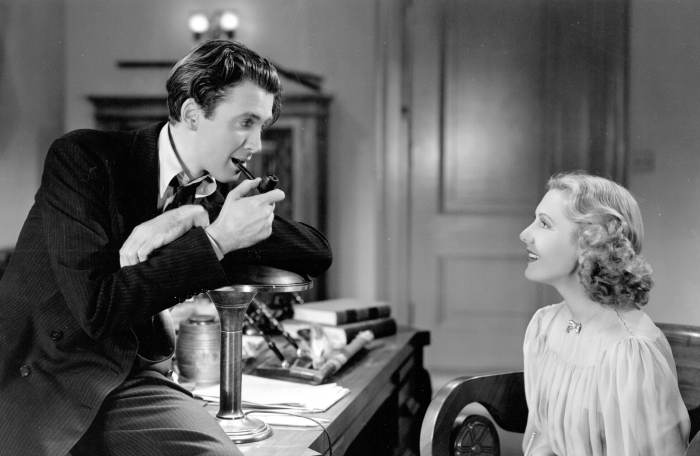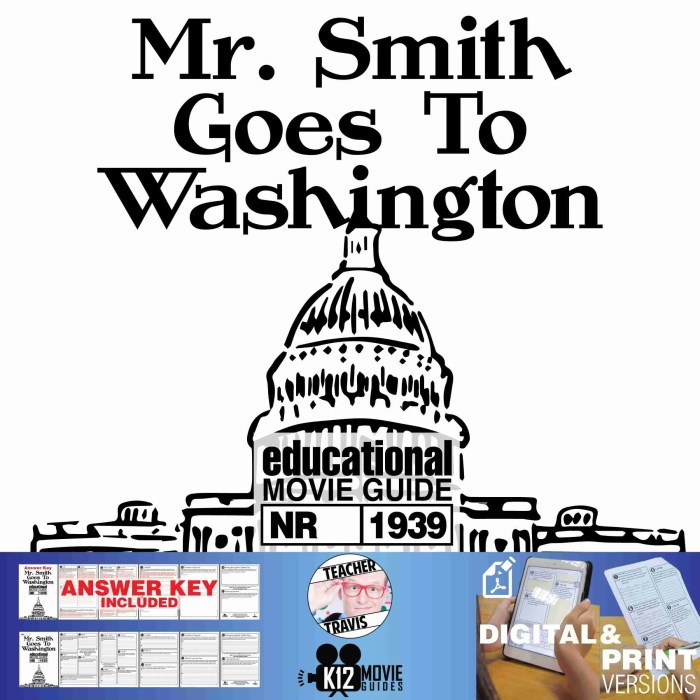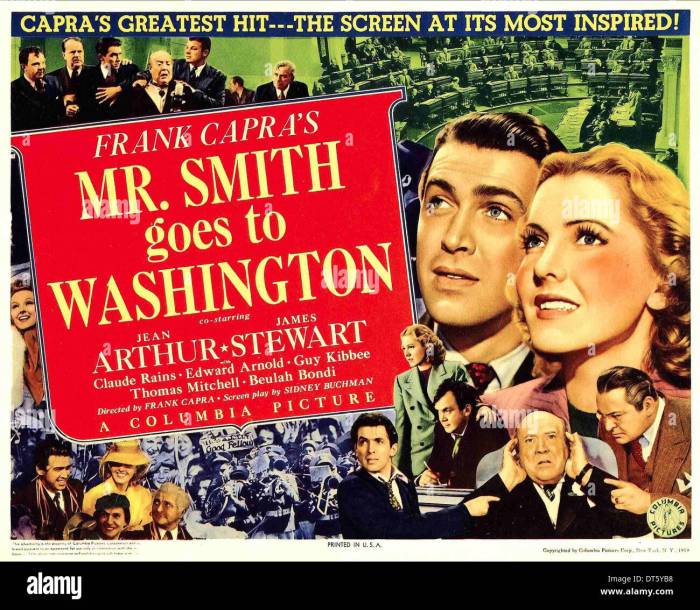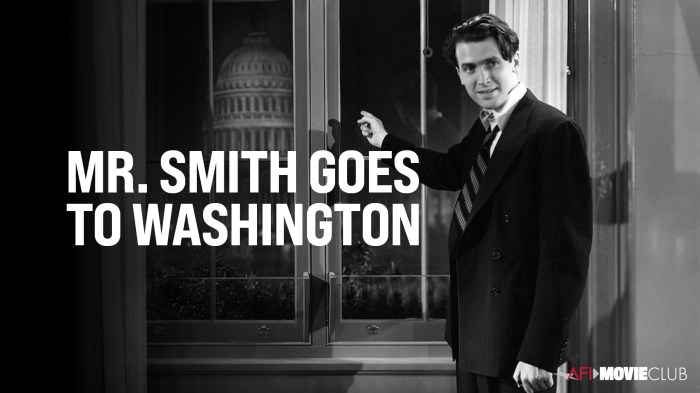Mr smith goes to washington answers – Mr. Smith Goes to Washington Answers provides a profound examination of political idealism and corruption, inviting readers to delve into a captivating narrative that unveils the complexities of the political landscape. This timeless film poses thought-provoking questions about the nature of power, the importance of integrity, and the role of the media in shaping public opinion.
Through the lens of Mr. Smith’s journey, we witness the clash between idealism and the harsh realities of political life. The film’s exploration of the challenges faced by those who dare to stand up for their beliefs resonates deeply with audiences, offering valuable insights into the complexities of political power and the enduring power of idealism.
Character Analysis

Jefferson Smith is a naive but idealistic young man who is appointed to the United States Senate after the death of his predecessor. He arrives in Washington, D.C., full of hope and ambition, but he soon learns that the political world is a corrupt and cynical place.
Despite the challenges he faces, Smith never gives up on his beliefs. He fights for what he believes in, even when it means standing up to powerful people. His courage and determination inspire others to believe in him, and he eventually succeeds in making a difference in the world.
Mr. Smith’s Personality Traits
- Naive
- Idealistic
- Courageous
- Determined
Mr. Smith’s Values
- Honesty
- Integrity
- Justice
- Equality
Mr. Smith’s Character Evolution, Mr smith goes to washington answers
Smith’s character evolves throughout the film as he learns about the realities of politics. He starts out as a naive idealist, but he gradually becomes more realistic and pragmatic. However, he never loses his core values, and he always fights for what he believes in.
Political Themes

Mr. Smith Goes to Washingtonis a political satire that critiques the corruption and cynicism that pervade American politics. The film’s protagonist, Jefferson Smith, is an idealistic young man who is appointed to the United States Senate after the death of his predecessor. Smith quickly learns that the Senate is a corrupt institution, where special interests and political maneuvering take precedence over the public good.
The film’s critique of political corruption is scathing. Smith is repeatedly confronted with the realities of political life, including bribery, blackmail, and intimidation. He is disillusioned by the fact that his fellow senators are more interested in lining their own pockets than in serving the people.
The Importance of Idealism in Politics
Despite the corruption he encounters, Smith never loses his idealism. He believes that the Senate can be a force for good, and he fights to make it so. His idealism is a powerful force, and it eventually inspires others to join him in his fight against corruption.
The film’s message about the importance of idealism in politics is clear: even in the face of overwhelming odds, it is important to never give up on your beliefs. Idealism is a powerful force, and it can make a difference in the world.
The Relationship between the Media and Politics
The film also explores the relationship between the media and politics. Smith’s idealism is often at odds with the cynical reporting of the press. The media is quick to criticize Smith for his naiveté, and they often portray him as a fool.
However, Smith never gives up on his beliefs, and he eventually wins the respect of the press.
The film’s portrayal of the relationship between the media and politics is complex. The media can be a powerful force for good, but it can also be used to manipulate public opinion. It is important to be aware of the media’s biases, and to be critical of the information that is presented to us.
Historical Context

Set against the backdrop of the Great Depression, Mr. Smith Goes to Washingtoncaptures the political climate of the 1930s. The film’s protagonist, Jefferson Smith, represents the idealistic and naivete of a new generation of Americans seeking to restore integrity and honesty to the political system.
Political Climate of the 1930s
- Economic Depression: The Great Depression ravaged the United States, leading to widespread unemployment, poverty, and social unrest.
- Political Corruption: The era was marked by widespread political corruption and influence peddling, as corporations and special interests exerted undue influence over elected officials.
- Rise of Demagoguery: Demagogues and populists, like Huey Long and Father Coughlin, gained popularity by appealing to the fears and frustrations of the American people.
Filmmaking Techniques: Mr Smith Goes To Washington Answers

The film “Mr. Smith Goes to Washington” showcases a masterful use of cinematography, editing techniques, and music to create a powerful and evocative narrative. These techniques work in harmony to establish the film’s mood and atmosphere, enhance the emotional impact, and contribute to the overall storytelling.
Cinematography
The film’s cinematography, directed by James Wong Howe, is characterized by its use of high-contrast lighting and deep focus. The stark contrast between light and shadow creates a sense of tension and drama, while the deep focus draws attention to the characters and their surroundings.
The camera movements are often fluid and sweeping, capturing the characters’ emotions and the grandeur of the Capitol building.
Editing
The film’s editing, by William Hornbeck, is seamless and rhythmic. The transitions between scenes are smooth and often unnoticeable, creating a cohesive flow. The use of montage sequences adds a sense of urgency and excitement to the narrative. The editing also highlights the juxtaposition between the idealism of Jefferson Smith and the corruption of the political system.
Music and Sound Effects
The film’s score, composed by Dimitri Tiomkin, is an integral part of the storytelling. The music swells during moments of emotional intensity, underscoring the characters’ feelings and the dramatic events unfolding. The sound effects, such as the ticking of clocks and the rustling of papers, add a layer of realism and enhance the immersive experience for the audience.
Cultural Impact

Upon its release in 1939, Mr. Smith Goes to Washingtonwas a critical and commercial success. It won two Academy Awards, including Best Picture, and was nominated for eight others. The film was praised for its idealism, its humor, and its performances, particularly that of James Stewart as Jefferson Smith.
The film has had a lasting impact on American culture. It is often cited as one of the greatest films ever made, and it has been remade several times. The film’s message of hope and idealism has inspired generations of Americans, and it continues to be relevant today.
Influence on Subsequent Political Films
Mr. Smith Goes to Washingtonhas had a significant influence on subsequent political films. It helped to establish the “idealist” political film genre, which typically features a protagonist who is idealistic and determined to make a difference in the world. Other films in this genre include The Best Years of Our Lives(1946), The Candidate(1972), and The Insider(1999).
Mr. Smith Goes to Washingtonalso helped to popularize the use of humor in political films. The film’s blend of humor and drama has been imitated by many subsequent political films, including Dr. Strangelove or: How I Learned to Stop Worrying and Love the Bomb(1964), Wag the Dog(1997), and Vice(2018).
Top FAQs
What is the main theme of Mr. Smith Goes to Washington?
The main theme of Mr. Smith Goes to Washington is the conflict between idealism and political corruption, exploring the challenges faced by those who dare to stand up for their beliefs.
How does Mr. Smith’s character evolve throughout the film?
Mr. Smith’s character undergoes a significant transformation throughout the film, evolving from a naive idealist into a savvy political operator who learns to navigate the complexities of the political landscape without compromising his principles.
What is the significance of the media’s portrayal in Mr. Smith Goes to Washington?
The film’s portrayal of the media highlights the power of the press to shape public opinion and influence political outcomes, underscoring the importance of a free and independent press in a democratic society.
